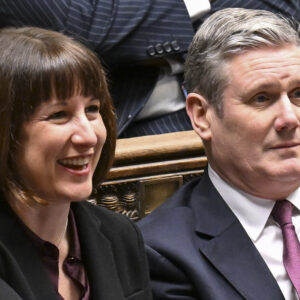Over the last year, I participated in two Labour Party policy meetings in my constituency that were intended to contribute to the discussion at last weekend’s National Policy Forum in Nottingham. I even drafted proposals on Health and Education that we sent to the national office. Even at the time, members were rightly cynical about the whole exercise since we knew that it was the Starmer leadership who would draw up the manifesto at the Clause V meeting with union leaderships in the run-up to the election. Anything radical or remotely linked to the policies supported by the Corbyn leadership would be removed even if they had won majorities at the Labour Party Conference, which is supposedly the parliament of the movement. Still, we thought it important to continue the fight for policies that actually changed things for the many, and such discussion always helps to develop a local political education and culture.
So I switched on to Tuesday’s feedback webinar from the Labour Left, sponsored by Arise, Campaign for Labour Party Democracy, Momentum, Labour Hub, Labour Assembly against Austerity, Grassroots NLP delegates, and John McDonnell, which you can still see here at the Arise Facebook page. An article in the Guardian also gives some more details. Its headline, “Starmer excludes uncosted policies in victory over Unite and activists” sums up the main takeaway from the weekend.
The fact that there was an organised opposition to Starmer from activists and some trade unions, even in a stage-managed event much narrower than the conference, shows that the left opposition is not entirely dead in Labour. The fact that the mainstream media mentions the unions linked to the activists is significant. Historically, the union leadership has saved the Labour leadership from defeats at conference by constituency members. While the left inside Labour is much diminished from the Corbyn years, it is still made up of thousands of activists.
“The fact that there was an organised opposition to Starmer from activists and some trade unions, even in a stage-managed event much narrower than the conference, shows that the left opposition is not entirely dead in Labour.”
Blair came up with the National Policy Forum (NPF) to try and avoid the lively discussions at conferences that typically adopted progressive policies, even though the leadership could and typically did ignore them. Policies challenging New Labour’s accommodation to neo-liberalism could be shunted away into the National Policy Forum, and this gave the leadership more space to stage-manage the conference as a rally with less time for members’ interventions. The conference is split 50/50 between members and affiliates, whereas the NPF has a much smaller proportion of member representation.
Still, leftist activists have to have quite a strong political stomach to go through the NPF charade. The leadership managed to stop any formal votes on any serious amendments and avoided any opposition from the unions that might have led to amendments being put to conference against the wishes of the leadership.
You might have thought that an open leadership wanting to win deeper political support from the general public or even just from the labour movement might have opened up proceedings by organising a live stream. No, on the contrary, it was all behind closed doors, and delegates were even advised not to give too much detail about votes or amendments in any report they might make. Of course, the leadership leaked details of their wonderful result to the mainstream media. As Andrew Fisher, former editor of the 2017 and 2019 manifestos, has acidly remarked in his Labour Hub article, it seems like the leadership does not want any political debate. If you ditch enough policies, there is not much to discuss anyway.
You noticed the tension between two opposing emotions as you watched the comrades give their feedback. Most of them recognised the whole thing was a bit of a farce controlled by the leadership, and not many had any illusions on that front. On the other hand, it is a bit like when you stick to the end of a film even if it is excruciatingly boring—you committed your money and you want some value for it. So people looked for some small victories for their efforts in bringing ideas to the forum. According to the disabled activist representative, some of his proposals for inclusion at work and in housing construction were adopted. Similarly, the international affairs rep was upbeat about some progress too, which was really hard to identify. Another delegate seemed to think the Labour pledge to tax private schools was some sort of new gain, whereas this was one pledge that has not been dumped (yet!).
There was also a sense that the struggle goes on even if you are losing; you cannot let them grind you down. So Mish Rahman, who had been dumped from a parliamentary selection despite being endorsed by seven unions, relished the fact that he had the opportunity to be there and look at the NEC hacks in the face—nothing dishonourable in that.
There were Twitter reports that leadership staffers annoyed the union delegations with their arrogant attitude when issues around repressive labour laws or welfare regulations like the two-child benefit limit were raised. No commitments were made on the minimum wage or abolishing the lower youth rate. Given this caution, union leaders refused to accept some of the final formulations, and interpersonal relations were apparently quite fraught. It is hard to keep up with all the U-turns since it is becoming almost a weekly event. Accepting the two-child benefit limit comes only a few weeks after shadow ministers denounced it—even Starmer was calling it heinous a few months ago.
Not only are all the Corbyn policies in the bin, such as common ownership of utilities or any real wealth, but even New Labour policies are falling foul of Reeves’ entirely artificial erection of strict fiscal rules. She acts as if these rules are part of the laws of nature, like gravity. Even other capitalist states in Europe have a more flexible approach without provoking Armageddon. As Andrew Fisher notes in his feedback, Blairite policies like SureStart are off the table, and Labour may even ditch the triple lock for pensioners if the Tories were to do such a thing before the election. In fact, the quickest way to work out Labour’s policy shifts is to see what the Tories are saying. Sunak rows back on the Tories’ timid green policies after Uxbridge, so Starmer basically calls on Sadiq Khan to retreat on the ULEZ project.
Neil Lawson is no Corbynist; he worked within the New Labour leadership with Gordon Brown, but he is currently under threat of exclusion for broaching the issue of electoral pacts. He may not end up being excluded, but he thinks that Starmer’s team is more narrow and more scared of political debate than Blair ever was.
[Blair’s team} were “hegemonic: their attitude was: ‘We want everyone to be part of this thing.’ It may have been clever co-option on their part” – quelling dissent by drawing in everyone – “but whatever it was, it was a damn sight more intriguing and inquiring and interesting than this silence … This lot, there’s no intellectual conversation to be had.”
neil lawson speaking to Zoe WILLIAMS Guardian
Lawson thinks Starmer is distrustful of even the soft left.
People like Luke Ackhurst the secretary of Labour First, (…) have only one project: “To seal the tomb of the left in Labour, to make sure there’s no alternative, not even the soft left, because the soft left is the gateway drug to the hard left. They nearly lost control of the party [to Corbyn and, arguably, to Ed Miliband], and they were lucky to get back in again. I think it is absolutely industrial, cynical, determined and it’s never going to stop. They need to get rid of the seedbed, anything that might produce people who could support Lisa Nandy or Andy Burnham or someone we don’t yet know of, in the future”.
neil lawson speaking to Zoe WILLIAMS Guardian
Despite the fact that this is a bit rich coming from someone who did nothing to defend the Militant or others expelled under Kinnock or New Labour, it does raise the tactical issue of how people on what you might define as the hard, ex-Corbynist left relate to the soft left. There may be a basis for drawing wider forces together to campaign on the U-turns. Combining campaigns is one thing, such as Burnham’s opposition to the U-turn on the two-child limit, but it is quite another to have any illusions that Burnham is a strategic alternative or even Corbyn 2.0.
“Neil Lawson thinks Starmer is distrustful of even the soft left. People like Luke Ackhurst the secretary of Labour First, (…) have only one project: ‘To seal the tomb of the left in Labour, to make sure there’s no alternative, not even the soft left, because the soft left is the gateway drug to the hard left.'”
Andrew Fisher recommended that the left within the party take more risks and commit much more to campaigns that are outside the party. John McDonnell, who closed the webinar, reiterated the need for work outside the party and proposed a series of stages that the left’s mobilisation had to pass through. He proposes working for a radical King’s Speech as Labour takes office, leading to what he feels is a crucial moment when the Labour government is established one year in and is faced with some sort of crisis. He feels this will be an opportunity for the left and the movement, particularly the unions, to exert pressure and prevent the far right from taking advantage of the situation. He summed up his approach as the left ‘saving the Labour government from itself’.
We can welcome John’s call for more campaigning, more unity on the left, and the need to make demands on a labour leadership or government. Perhaps he is overly optimistic about the union leadership confronting what they have traditionally considered to be ‘their government’. Let us hope he is right and the new militancy we have seen over the last year continues. However, there is an underestimation of the need to build an eco-socialist movement that has a strategic axis of self-organisation and the need for a political alternative to Labourism. In other words, it is no good just campaigning as if the only political objective is to ‘pressure’ an incoming government. His slogan about saving a Labour government is the same old, same old delegation of change to an ‘enlightened Labour leadership.
The lessons of the failure of the Corbyn project – that the Labour Party cannot be won seamlessly to a radical break with the system; there will be a split, just as the Right organised a de facto one against Corbyn. A different sort of political instrument is necessary that does not limit itself to electing or even pressurising a Labour government but is able to organise an independent labour movement that can begin to confront the capitalist state and build a more democratic one that defends the interests of the many and the environment.
“The lessons of the failure of the Corbyn project – that the Labour Party cannot be won seamlessly to a radical break with the system; there will be a split, just as the Right organised a de facto one against Corbyn. A different sort of political instrument is necessary that does not limit itself to electing or even pressurising a Labour government but is able to organise an independent labour movement that can begin to confront the capitalist state and build a more democratic one that defends the interests of the many and the environment.”
Art (54) Book Review (127) Books (114) Capitalism (68) China (81) Climate Emergency (99) Conservative Government (90) Conservative Party (45) COVID-19 (45) EcoSocialism (60) Elections (83) Europe (46) Fascism (62) Film (49) Film Review (68) France (72) Gaza (62) Imperialism (100) Israel (129) Italy (46) Keir Starmer (56) Labour Party (115) Long Read (42) Marxism (50) Marxist Theory (48) Palestine (179) pandemic (78) Protest (154) Russia (341) Solidarity (147) Statement (49) Trade Unionism (142) Ukraine (349) United States of America (134) War (370)
Latest Articles
- Beyond Appearances, Trans SolidarityThe idea of policing single-sex spaces based on appearances is deeply regressive,.Echo Fortunemakes the case for urgent solidarity.
- Urgent call for solidarity: support Sri Lanka’s flood and landslide relief effortsThis appeal comes from the Socialist People’s Forum, Sri Lankan organisation of the Fourth International. ACR has made a direct donation and we are also asking readers who can to send donations via our account ( to minimise bank charges.)
- I promise that I will (not) obey in advanceLast week, two major UK organisations, Girlguiding and the Women’s Institute, gave in to the anti-trans movement and announced that they would no longer be accepting trans women and girls as members, explains Alice Nuttall.
- COP 30: entrenching the crisis of climate politicsHow has COP 30 failed to address the climate catastrophe? Brian Ashley looks at the continued crisis of political solutions to ecological disaster.
- Labour’s budget – further into the abyssRachel Reeves’s budget is business as usual, or rather, slightly worse than that, argues Jamie Gough.







Transform (transformpolitics.uk) – “a call for a new party of the Left”, was launched on Tuesday, 25 July.
Following the launch 3,000 plus supporters had signed up in the first 48 hours, with 500,000 plus viewings of the launch video. The launch was featured in the Morning Star, Skwawkbox, and the Voice.
The Breakthrough Party, Left Unity, People’s Alliance of the Left, and the Liverpool Community Independents have come together along with support from people across our movement.
These include former Labour MP Thelma Walker, National President of BFAWU Ian Hodson, and former Labour Women’s Committee and Momentum NCG member Solma Ahmed to launch and sign this call for a new left party.
The right wing has regained control of Labour. Jeremy Corbyn, and his politics that inspired millions across our society, have been cast out.
Labour now opposes strikes, rejects renationalisation, refuses to defend refugees, and won’t scrap student fees – or even the two-child benefit cap.
Keir Starmer has overseen the driving out of 200,000 Labour members. ‘The many’ who supported Labour politics from 2015 to 2019 are denied a political voice.
We need a political organisation that offers a real solution: one that challenges the system at the root of every crisis we face. Over recent months, organisations and individuals from the labour and trade union movement have come together to discuss a way forward.
Now we are taking the next step: inviting all who agree with our core principles to move rapidly towards founding a new party of the left. Together, we can transform politics. The time is now.
John Smithee
Transform Supporter
Dave writes that “the conference is split 50/50 between members and affiliates, whereas the NPF has a much smaller proportion of member representation”. Apart from the strange use of the term ‘member’, when all TU delegates to LP conference rate also members, whereas I imagine what he means is CLP representation, the main point of Blair introducing the NPF was to reduce the influence of both CLPs AND unions. Blair was no friend of the unions.